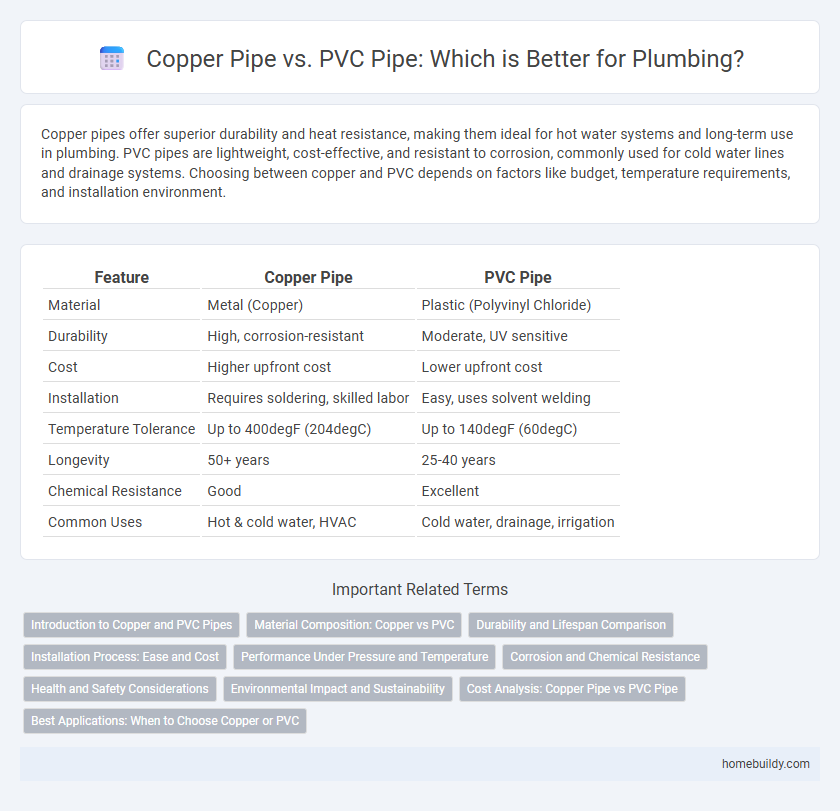Copper pipes offer superior durability and heat resistance, making them ideal for hot water systems and long-term use in plumbing. PVC pipes are lightweight, cost-effective, and resistant to corrosion, commonly used for cold water lines and drainage systems. Choosing between copper and PVC depends on factors like budget, temperature requirements, and installation environment.
Table of Comparison
| Feature | Copper Pipe | PVC Pipe |
|---|---|---|
| Material | Metal (Copper) | Plastic (Polyvinyl Chloride) |
| Durability | High, corrosion-resistant | Moderate, UV sensitive |
| Cost | Higher upfront cost | Lower upfront cost |
| Installation | Requires soldering, skilled labor | Easy, uses solvent welding |
| Temperature Tolerance | Up to 400degF (204degC) | Up to 140degF (60degC) |
| Longevity | 50+ years | 25-40 years |
| Chemical Resistance | Good | Excellent |
| Common Uses | Hot & cold water, HVAC | Cold water, drainage, irrigation |
Introduction to Copper and PVC Pipes
Copper pipes offer exceptional durability, corrosion resistance, and high thermal conductivity, making them ideal for hot and cold water supply systems in residential and commercial plumbing. PVC pipes are lightweight, cost-effective, and resistant to chemical corrosion, commonly used for drainage, waste, and vent systems due to their ease of installation and low maintenance. Both materials serve distinct purposes in plumbing systems, with copper preferred for pressurized water lines and PVC valued for non-pressurized applications.
Material Composition: Copper vs PVC
Copper pipes consist of natural metal alloys primarily containing copper, offering high durability, thermal conductivity, and resistance to corrosion and biofilm buildup. PVC pipes are made from polyvinyl chloride, a thermoplastic polymer known for its lightweight properties, chemical resistance, and cost-effectiveness in non-metallic piping systems. Material composition affects longevity, installation ease, and suitability for hot or cold water applications in plumbing systems.
Durability and Lifespan Comparison
Copper pipes offer superior durability with a typical lifespan of 50 years or more, resisting corrosion and high temperatures effectively. PVC pipes, while more affordable and corrosion-resistant, generally last around 25 to 40 years under optimal conditions but can degrade when exposed to UV light and extreme temperatures. Choosing between copper and PVC pipes depends on specific plumbing needs, environmental factors, and budget considerations.
Installation Process: Ease and Cost
Copper pipe installation involves soldering or compression fittings, requiring specialized skills and tools, which can increase labor costs. PVC pipe is lightweight, easily cut, and joined with solvent cement, allowing quicker and more affordable installation, especially for DIY projects. Overall, PVC offers cost-effective and simpler installation, whereas copper provides durability but at a higher labor expense.
Performance Under Pressure and Temperature
Copper pipes exhibit superior performance under high pressure and elevated temperatures, maintaining structural integrity and resisting deformation up to 400degF and pressures exceeding 800 psi, making them ideal for hot water supply and heating systems. PVC pipes are limited to lower pressure ratings, typically up to 280 psi, and cannot withstand temperatures above 140degF without risk of warping or failure, restricting their use primarily to cold water and drainage applications. The thermal conductivity and rigidity of copper ensure consistent flow rates and durability, while PVC's chemical composition limits its application in demanding plumbing environments.
Corrosion and Chemical Resistance
Copper pipes exhibit excellent corrosion resistance in typical water supply applications but may corrode in acidic or highly alkaline environments, leading to pinhole leaks over time. PVC pipes offer superior chemical resistance compared to copper, making them ideal for transporting aggressive chemicals and wastewater without degradation. Choosing between copper and PVC hinges on specific water chemistry and exposure conditions to ensure durability and maintain pipe integrity.
Health and Safety Considerations
Copper pipes offer natural antimicrobial properties that inhibit bacterial growth, making them a safer option for drinking water systems. PVC pipes, while resistant to corrosion, may release trace amounts of chemicals like phthalates or vinyl chloride, which require careful monitoring to ensure water safety. Both materials demand proper installation and regular inspection to prevent leaks, contamination, and potential health hazards.
Environmental Impact and Sustainability
Copper pipes, made from a recyclable metal, have a lower environmental impact due to their durability and longevity, reducing the need for frequent replacements and minimizing landfill waste. PVC pipes, while cost-effective and lightweight, pose sustainability challenges because they are derived from non-renewable petroleum, release harmful chemicals during manufacturing, and have limited recyclability. Choosing copper enhances sustainability through recyclability and reduced environmental toxins, whereas PVC's environmental footprint remains significant despite its widespread use in plumbing systems.
Cost Analysis: Copper Pipe vs PVC Pipe
Copper pipes typically cost between $2 to $4 per linear foot, while PVC pipes range from $0.50 to $1.50 per linear foot, making PVC significantly more budget-friendly for large-scale plumbing projects. Installation expenses also vary, with copper requiring skilled soldering labor, increasing overall costs by 30-50% compared to the easier, solvent-welded PVC pipe installation. Long-term maintenance and durability should be factored in, as copper pipes offer greater longevity but at a higher initial investment than PVC.
Best Applications: When to Choose Copper or PVC
Copper pipes are ideal for hot water supply lines and areas requiring durability and resistance to high temperatures, while PVC pipes excel in cold water systems, drainage, and irrigation due to their lightweight and corrosion-resistant properties. Choose copper for plumbing installations involving high pressure and temperature to ensure longevity and reliability. Opt for PVC in cost-effective, non-pressurized applications where ease of installation and chemical resistance are priorities.
Copper pipe vs PVC pipe Infographic

 homebuildy.com
homebuildy.com